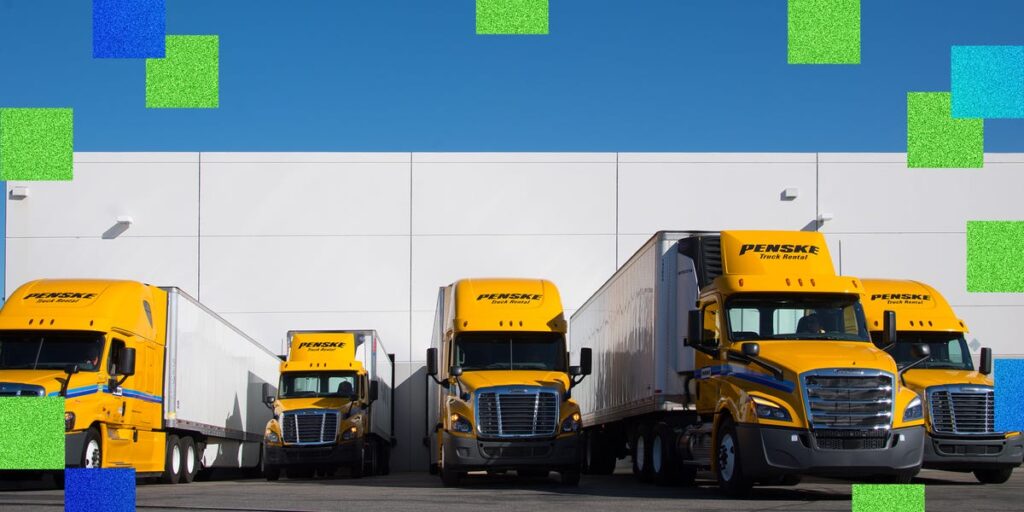When you own, operate, and lease hundreds of thousands of trucks across the country, keeping your fleet on the road and running smoothly is paramount to success.
Traditionally, trucking companies have tackled fleet maintenance using two methods: Oil changes every 5,000 miles, based on odometer readings, or after performance failures happen. In both cases, maintenance can often happen too late and cost a company revenue or customers.
This is where artificial intelligence can help. By using AI to collect and analyze data from different systems on board their trucks, companies can track performance in real time and gain insight into when a part or system might need repair, getting ahead of revenue-sucking disruptions.
Penske Truck Leasing, which operates a fleet of roughly 433,000 for-lease vehicles, has found success with this AI-backed approach to maintenance.
“The best option for us to handle maintenance is to do it on a preventive basis, before things become problems,” Tim Haynes, the vice president of digital and customer data at Penske, told Business Insider. “This keeps trucks on the road, and that’s our goal for everyone involved.”
Data-driven decisions
Penske’s truck-maintenance system is called Fleet Insight. It’s powered by telematics devices, or iPhone-sized pieces of hardware that collect data and send it to Penske headquarters over cellular networks, and Penske’s proprietary AI, called Catalyst, which analyzes real-time data on more than 200,000 trucks.
Certain trucks, depending on their age and the typical terrain they encounter, come equipped with several telematics devices. Over the course of a route, the devices, which sit on a truck’s wiring harnesses, can collect and record thousands of data points on engine performance and temperature, gas mileage, and braking incidents.
Once this data is sent to Penske’s headquarters, the AI engine sifts through it for anomalies that suggest a maintenance check is overdue. With this technology, Penske collects 300 million data points daily and is on track to collect more than 100 billion data points this year, Haynes said.
The information is uploaded to Penske’s servers, then their AI engine examines the data points, looking for patterns that suggest a major maintenance issue is imminent. The AI engine then alerts fleet managers, who alert other humans out in the field, Haynes said. Together, the group is expected to figure out a way to solve the potential problem.
“The goal is to take a look before the maintenance issue becomes more serious,” Haynes said.
Helping leasing customers keep costs down
Penske uses these devices to assist local trucking companies that lease their vehicles. For example, Haynes said Penske might call up a local trucking company and suggest maintenance for a specific truck based on the vehicle’s proximity to the nearest Penske shop.
One of Penske’s clients, Darigold, a dairy cooperative in the Pacific Northwest, leases 111 tractors and 184 trailers from Penske and has used its Fleet Insight technology.
Brian Harper, Darigold’s leader of fleet operations, said that the cooperative uses Penske’s system almost daily to check on preventative maintenance statuses — for things like tires and hoses — for its leased fleet.
Once Darigold employees identify a troubled tractor, they can use Penske’s AI to understand the cost of a tractor outage, including how its time on the sidelines could impact the overall fleet, Harper said.
He added that Penske provides benchmarking data that has informed how Darigold manages fuel across its fleets. For example, if Darigold were to set a fuel utilization goal of 6.2 mpg and the Penske system indicates the industry comparison is 7 mpg, Darigold could investigate the reasons behind underperformance and identify a fix to improve fuel efficiency, Harper said.
“It creates a new, dynamic way to benchmark fleet performance, unearths new ways to improve efficiency and arms you with insights to make more confident decisions,” Harper told BI. “These tools have completely changed how we manage and monitor our fleets.”
Another Penske client, Honeyville, uses Penske’s Catalyst AI to monitor maintenance issues for trucks it leases to transport bulk grains around the country.
Marcasa Ahlstrom, the corporate transportation manager for Honeyville, said she previously manually sifted through performance and fuel efficiency data — a process that took so long that she often failed to catch issues before they caused delays or rendered trucks inoperable.
“Since we started using Catalyst AI, our response time to issues has greatly improved, which in turn allows us to reach our efficiency goals faster,” Ahlstrom wrote in a recent email to BI. “Catalyst AI allows us to dial down into our preventative fleet-maintenance routine, which helps us stay on top of fleet performance and identify potential issues before they become costly problems.”
Haynes said that the data points Penske provides with its AI technology represent a widespread shift in the industry to leverage data to make better decisions and plan for the future.
“As vehicles change, as technology changes, we now have an ability to collect data in large quantities and apply our expertise to this and be able to make sure we’re staying ahead of any problems that might arise,” he said. “That’s a powerful way of approaching maintenance issues down the road.”
Read the full article here















